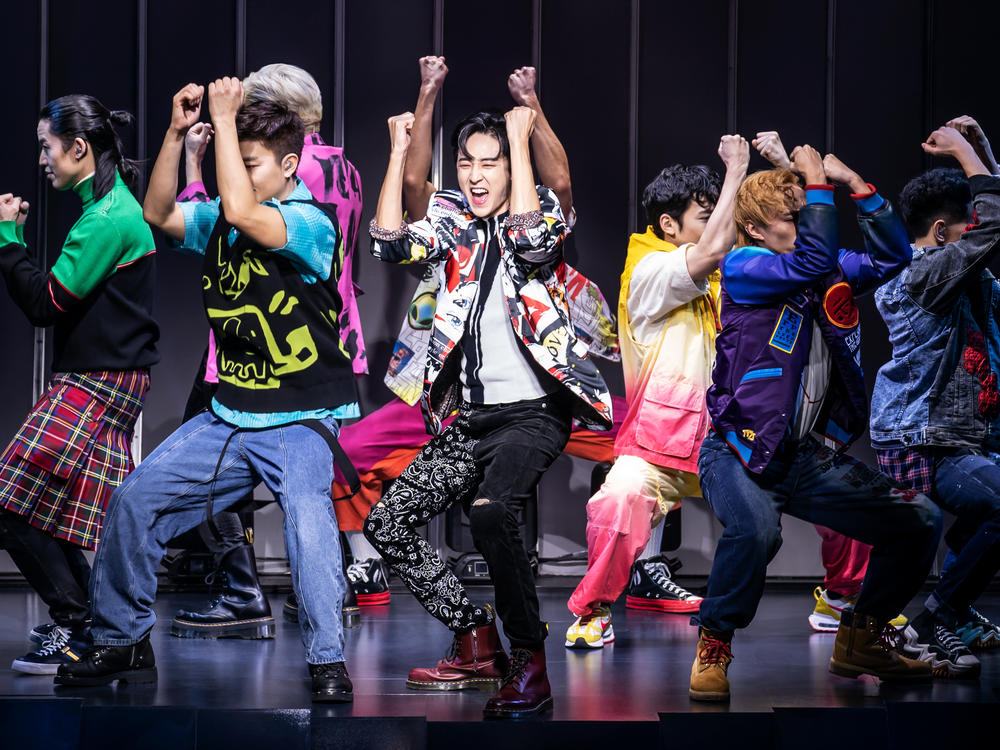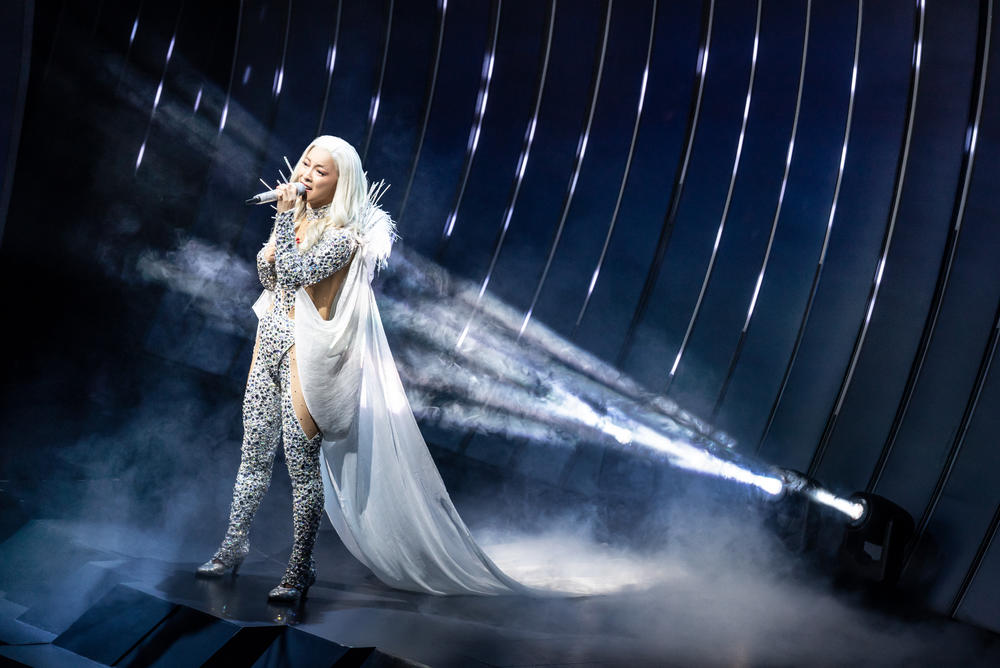Section Branding
Header Content
Korean pop star Luna comes to Broadway in 'KPOP'
Primary Content
The South Korean cultural phenomenon K-pop is now a Broadway musical – simply called KPOP. The show is a kind of MTV Behind the Music story about a fictional Korean label, RBY, presenting a concert in New York City.
Shortly after the start of KPOP, the audience is immersed in a high-energy performance of a song called "This is My Korea." A girl group with five singers, RTMIS (pronounced Artemis), sings in Korean as they come onstage. Swaying their arms and hips in synchronized, repetitive movements, the singers then switch over to English, like in many K-Pop songs.
They're followed by a boy band with nine singers, F8 (pronounced Fate), doing the same material, but with macho, smoldering movements. And then they all sing together, doing point moves choreographed by Jennifer Weber, where the performers make a "K" with their hands every time they sing the word "Korea."
"That keeps coming back to become a visual hook at the same time that it's a vocal hook," Weber said.
KPOP is an unconventional musical – there are no traditional solos or duets where characters sing their emotions directly to the audience or to each other.
But director Teddy Bergman said "This is My Korea" still functions like an old-fashioned Broadway opening number.
"There are many ways in which that song is like our version of 'Tradition' from Fiddler [on the Roof]. It introduces a set of [characters]; a kind of big thematic banner for the evening," he said.
Off Broadway the show asked: "Why isn't K-pop a hit in the U.S.?" Now that's changed.
The show was originally performed as an immersive off-Broadway piece in 2017, where audiences went from room to room — seeing bits and pieces of rehearsals, auditions and recording sessions — before gathering together in a large space to watch a concert. At the time, K-Pop hadn't really cracked the American cultural consciousness, beyond PSY's monster hit, "Gangam Style."
"The animating question of the show off-Broadway was, why has K-pop been successful all over the world, with the notable exception of the United States?" said Bergman. "And blessedly, that that has changed over these five years with K-pop acts enjoying enormous and wonderful success in the United States."
So the current production has switched things up, immersing its audience in dynamic performances of spot-on songs in different styles, with outrageous costumes. Since it's a documentary-style story with flashbacks, the audience gets a glimpse inside the pressure-cooker K-pop factory, where performers are driven to perfection, often at personal sacrifice.
"What I was really interested in, going into this, was the psychology behind an international star," said Jason Kim, the Korean-born author of the show's script. He says he uses some tropes from Korean television melodramas. "What do people like BTS, what do people [like] CL... What does she think when she gets up in the morning and what is her day to day? And what is it like before she goes on stage and what does she think of her stage performance and how does that affect your relationships?"
Kim said the show examines the dynamic between "this very Eastern concept of duty that accompanies self-expression....What does it look like when the two are in conflict with one another? And so, to me, that really is a thematic principle that ties everything together."
The show has several performers who are actual K-pop idols, including Luna, who plays the show's star, MwE. Luna has also appeared in many musicals, like Legally Blonde, in Korea. Her presence lends an air of authenticity.
"She's one of those people who has that very rare gift of being almost transparent on stage," said Bergman. "You can just read everything that's going on with her effortlessly. And as a singer and dancer, she's just virtuosic."
One of the show's songwriters is Helen Park, who was born in South Korea and loved K-pop as she was growing up. She's the first female Asian songwriter on Broadway and has created all the electronic backing tracks, which are accompanied by a small offstage band. Park said the score reflects the wide variety of K-pop styles.
"Every musical moment is kind of different from each other," Park said. "We have ballads, we have reggaetón, we have new disco, we've got progressive house. We've got everything in the pop medium."
As catchy as the music is, Max Vernon, who co-wrote the score with Park, said they wanted the songs to reflect the emotional states of the characters.
One song, called "Wind Up Doll," is performed by MwE, after she's rehearsed with an abusive choreographer.
"That song is so sparkly, it's so effervescent. It puts a smile on your face," said Vernon. "But if you actually listen to the lyrics, they're pretty sinister. You know, it's like, 'You push the gear/touch me that way/You wind me up like clockwork/and I obey.'"
At times, the audience at KPOP behaves as though it is at a concert, not a Broadway show – people whoop and cheer and move along to the music.
"K-pop as a genre and K-pop as a phenomenon I think is so welcoming," said Park. "It's inclusive, it's inviting."
Fans learn K-pop dances from videos, then post their own versions on social media. Already, choreographer Jennifer Weber said, some of the musical's fans are doing the same.
"It's been so cool to see that in our audience, to watch people already starting to do dance covers of things and to become fans of the groups [in the show]."
The show is currently in previews on Broadway — it opens Nov. 27.
Copyright 2022 NPR. To see more, visit https://www.npr.org.


